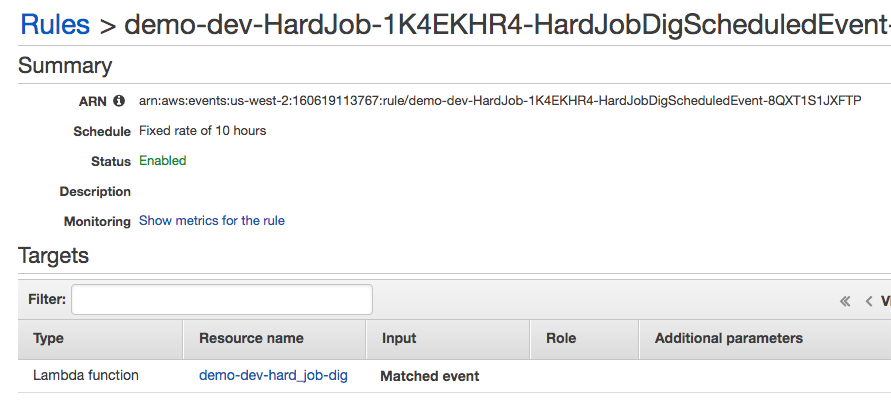Jobs
A Jets job handles work which is better suited to run in the background - outside of the web request/response cycle. Here’s an example:
app/jobs/hard_job.rb:
class HardJob < ApplicationJob
class_timeout 300 # 300s or 5m, current Lambda max is 15m
rate "10 hours" # every 10 hours
def dig
puts "done digging"
end
# Cron expression is AWS Cron Format and require 6 fields
cron "0 */12 * * ? *" # every 12 hours
def lift
puts "done lifting"
end
end
In our example, the job HardJob#dig will run every 10 hours, and HardJob#lift will run every 12 hours.
You can see the lambda functions which correspond to your job functions in the Lambda console:

The rate and cron methods create CloudWatch Event Rules to handle scheduling. You can see these CloudWatch Event Rules in the CloudWatch console:

Running Jobs Explicitly
You can run background jobs explicitly. Example:
event = {key1: "value1"}
HardJob.perform_now(:dig, event)
HardJob.perform_later(:lift, event)
In the example above, the perform_now method executes the job in the current process. The perform_later function runs the job by invoking the AWS Lambda function associated with it in a new process. It usually runs a few seconds later.
Note, remotely on AWS Lambda, the functions calling the perform_* methods need to have the IAM permission to call Lambda. For example, a simple iam_policy "lambda:InvokeFunction" should do it. See IAM Policies for more info.
Additional Arguments
Additional arguments are passed to the HardJob with an event hash.
event = {key1: "value1"}
HardJob.perform_now(:dig, event)
The event helper is available in the method.
class HardJob
def dig
puts "event #{event.inspect}" # event hash is avaialble
end
end
Cron Expression
The cron expression is in the AWS Cron format. The AWS Cron format has six required fields, separated by white space. This is slightly different from the traditional Linux cron format which has 5 fields.